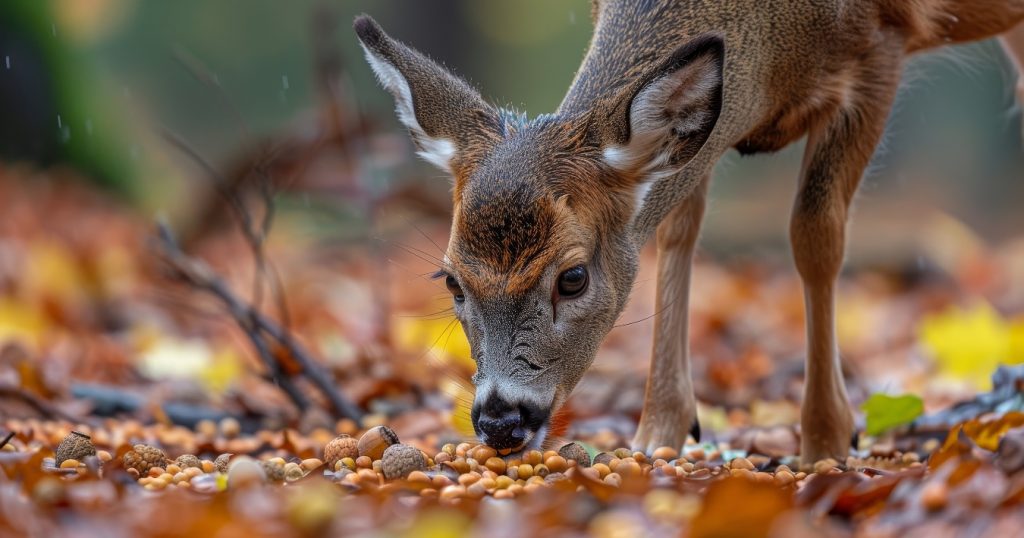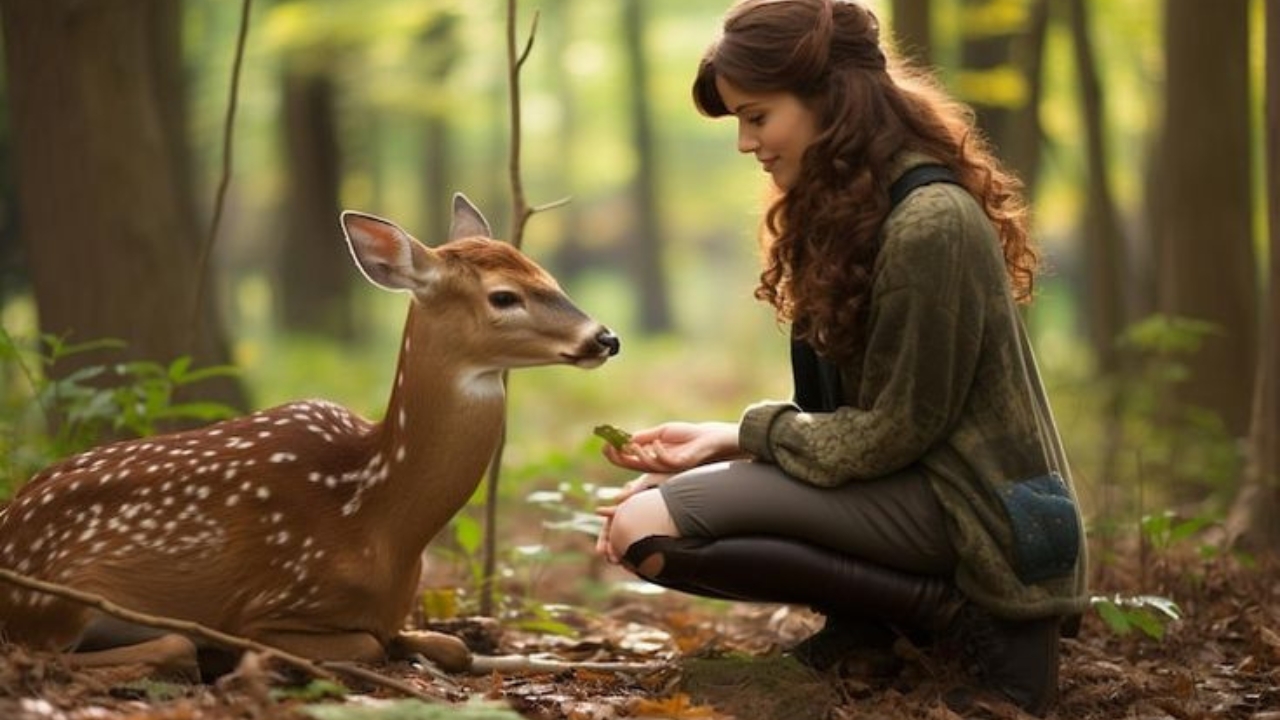How to keep deer away from garden, arrows and can enhance its looks or ruin your reserve. From natural repellents to physical barriers, click ahead for the best ways to defend your plants and landscaping.
Thank you for reading this post, don't forget to subscribe!Deer are many gardeners’ worst enemies, especially when they choose to dine upon your carefully tended plants. These graceful creatures are attracted to the gardens for the soft, abundant vegetation, and they can decimate your hard work in mere moments. This makes sense when you want to keep your plants free of deer damage. But there are lots of tricks you can use to avoid them and help protect your hard work. In this article, we will look some natural methods, physical barriers and repellents that can help protect your garden from these unwelcome visitors.
Why Do Deer Visit Gardens?
Before we jump into ways how to keep deer out, it’s crucial to note why they may attract your garden. Deer are also herbivores and they will look for green locations. Pros Fields and gardens often contain a wide range of plants, including vegetables, flowers, shrubs, and trees,that deer love to eat. They are attracted to young, succulent(new) growth and tender leaves, which are packed with nutrients.
Deer can be lovely to see on your property, but their interest in gardens can be destructive. If they do opt to peruse through your greenery, they can wreak significant havoc on flowers, shrubs, vegetables and trees. Worst part is that they tend to visit again and again, making it feel like a war that won’t end.

Use Deer-Repellent Plants
Perhaps the easiest way to keep the deer out of your garden is to plant species to which they are resistant. No plant is 100 percent deer-resistant, but some are less attractive than others. They are usually plants with strong scents, prickly textures or bitter taste that are less appetizing to deer.
A few deer-resistant plants are:
- Lavender: The strong smell of this shrub pushes deer away, and adds a sweet scent to your garden.
- Daffodils: The cheeriest of the bright and cheerful, daffodils are poisonous to deer.
- Thyme: This aromatic herb has a strong smell that deer do not like.
- Onions and Alliums: Their oniony smell and flavor prevent deer nibbles.
- Marigold: This plant has strong-odored flowers and can act as a deterrent against rabbits.
Remember that a deer’s appetite changes by the region, the season, and whether they have other food options.TheGuideToFlorals.com Recommends When selecting deer plants that deer don’t eat, know that they can eat anything depending on where you live so don’t rely solely on what deer eat by state. It’s a good idea to check with a garden expert before planting, and research your local deer species.
Create Physical Barriers
The best way to keep deer out of your garden can sometimes be with a physical enclosure. Deer can jump pretty high fences, but there are ways to design obstacles that are effective deterrents.
Fencing: The best way to prevent deer from invading your garden is through the use of a tall, sturdy fence. The fence height that is ideal for keeping deer from overtaking property is at least 8 feet. Deer can jump pretty high and may be able to clear shorter fences, so to keep them out, taller fences are required. You have plenty of material options for your fence, such as wire mesh, wood, or vinyl. The trick is to make sure it is high and without gaps that deer could wriggle through.
Electric Fences: Those of us who are not able to have a tall fence in this case this could work really well. The slight shock deer get when they come into contact with the fence will train them to stay away from your garden. They are generally used when larger and less economical barriers are impractical. Electric fences are also relatively simple to put up and can be an affordable means to keep deer away.
Tree Guards: Protect young trees or shrubs that are susceptible to deer damage with tree guards or wraps around the base. These physical barriers assist in safeguarding the tender trunks and foliage especially during winter, when deer have an increased tendency to feed on bark.

Scent and taste repellents can be employed
Use deer’s strong sense of smell against them. Scent repellents may render your garden unappealing to deer because they are put off by the odors or the smells are too potent. You can buy commercial deer repellents or make natural ones at home.
Garlic and Hot Pepper Deer Repellent: A homemade mixture of hot peppers, garlic and water can be very effective as a deer repellent. Whirl the ingredients together, strain the mix and spray it around your garden. Deer find the strong odors and heat of these ingredients very distasteful and will make sure to avoid your territory.
Blood Meal or Bone Meal: These organic fertilizers are rich in nitrogen and have an odor that deer don’t like. Deer can be deterred by sprinkling blood meal or bone meal around your garden.
Human Hair or Soap Bars: Stringing up human hair, or placing bars of pungent-smelling soap (like Irish Spring) around your garden can also help keep deer away. These smells replicate the scent of predators, causing deer to feel unsafe.
Commercial Repellents: Commercial deer repellents exist, which are made to irritate a deer’s sense or smell like its predators. They can be sprayed over plants or outside around the garden. Follow the manufacturer’s guidance for best results.
how to keep deer away from garden make the ground uncomfortable for them to stand on
If deer feel exposed they’re less likely to go near. You can also make the ground around your garden an uncomfortable place for deer and that will lessen the appeal of the space.
Gravel or Sharp Mulch Gravel: sharp mulch and even pine cones around your garden can make a surface deer would rather move along. Deer find sharp edges very uncomfortable to walk on and will actually leave the area rather than run with their delicate hooves.
Motion-Activated Sprinklers: These are movement-triggered devices that turn on and spray water when a deer comes into range. The sudden douse of water will spook the deer and scatter it. These can work very well, especially if they are placed at critical points of entry into your garden.
Use Visual Deterrents
Deer are easily frightened, and visual repellents MAY work to some extent, especially if the deer get easily spooked by especially bright lights or sudden movements.
Reflective Objects: Hanging shiny, reflective objects in and around your garden (i.e., aluminum foil strips, reflective tape, CD discs) may make deer wary of your plants. The flashing light and movement spook the deer, giving them the impression that a predator is close by.
Fake Predators: Deer can be skitterish, so putting an intimidating, life-like predator, like a plastic owl or a coyote decoy, in your garden can give them the willies. Currently, the guy says, deers stay away from places where they think they can be prey. But deer might become acclimated to these decoys over time, so be sure to change the location of the decoys from time to time.
Wind Chimes: WInd chimes that will clang in the wind are also a good visual repellent. On the other hand, the noise and motion will keep deer a little skittish, so they’ll perhaps be a little more likely to go elsewhere.
Maintain a Clean Garden
Deer are hang out in overgrown, unkept gardens. Tidiness Keeping your garden neat and orderly can also help make it less attractive to deer, which generally don’t like areas that don’t offer easy access to food. Trim bushes and cut down overgrown plants regularly to reduce the hiding spots and food source which attract deer.
Harvest Plants Early
If deer are eating up your vegetable garden, harvest your crops before you normally would. If you’re growing vegetables such as tomatoes, peppers or lettuce, harvesting before they are fully ripe will lower the risk of deer coming in for a snack.

FAQ
What are deer-resistant plants?
Other plants that deer typically find less appealing include lavender, daffodils, thyme marigolds and alliums. Such plants have strong odors or textures that are unpalatable to deer.
Can deer jump over a fence?
Yes deer can jump and they can jump very well, even fences that are 6ft or less. To keep them away, fences must be 8 feet high at minimum, though you can also try electric fencing.
Do motion sprinklers work?
Yes, motion-activated sprinklers work really well at scaring deer. The large explosion of water will shock them and drive them away from your garden.
How can I make my garden unstinky to deer?
You can create home-made repellents containing garlic, hot pepper, water, or you can purchase commercially made repellents. Blood meal and bone meal work as well as they smell bad to deer.
Q. If deer are eating my plants, what can I do?
If you catch the deer munching your plants, try scaring them away using visual deterrents such as faux predators or reflective surfaces. You can even use deer repellents to discourage them.
Conclusion:
How to protect your garden from deer Unfortunately, keeping deer out of your garden is not as simple as making a fence around it. You can discourage these animals by getting a handle on why they are drawn to your plants and utilizing a combination of tactics, such as planting deer-resistant varieties, erecting barriers, and applying scent and taste deterrents. Also, keeping your garden clean and using visual deterrents may help deter the deer. By using these common-sense approaches, gardeners can protect their plants and come out plant ahead with a winning garden – deer-free. Following these tactics will ensure your hard work stays healthy and intact.
